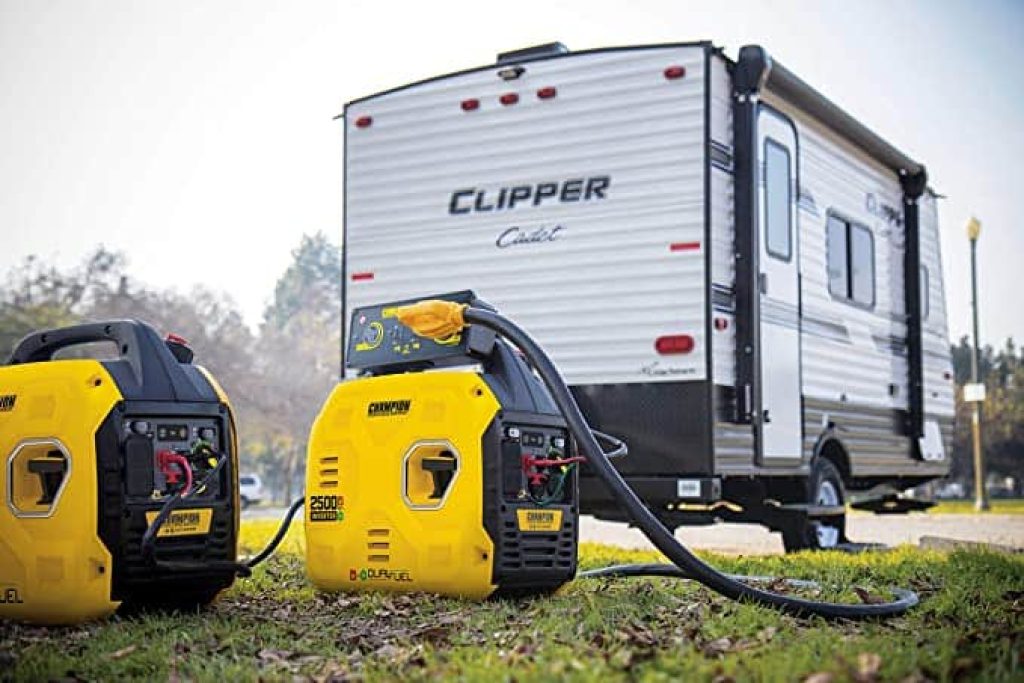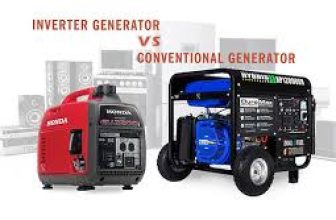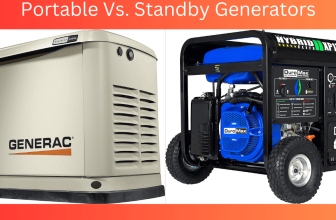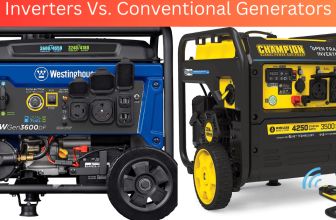
Generators are a great source of power when you are not connected to a grid. A generator will allow you to run your appliances and devices during a power outage. It also allows you to charge your phones and other electronics when you are camping.
Different Types Of Generators
Generators come in various types and sizes. Aside from knowing what an inverter generator is, you need to get the right generator that will satisfy your power requirements. Here are the different types of generators:

Home standby generator
Also known as a whole house generator, this type can keep all your home appliances running. It is expensive and takes up a lot of space, but it can power your entire home for several hours. It can be connected directly to your circuit board, and whole house generators will turn on automatically in times of emergency.
Portable generator
If you prefer a smaller generator, a portable generator is what you are looking for. Because it is small, you can easily move and carry portable generators. However, it does not have much power to keep all your home appliances running.
Inverter generator
What is an inverter generator? This type is very different from the standard generators. It automatically adjusts its engine speed depending on the electrical demands. Because it is not running at a constant speed, inverter generators are usually not noisy. It is more expensive than other generators, but it produces few emissions, easy to carry, and is easy to maintain.
Gasoline generator
It is the most popular type of generator. It is suitable to help run your lower-powered appliances, electronics, and tools. It is quieter than a diesel generator and cheaper to acquire. But you have to consider that over time, the cost of gas is more expensive.
Diesel generator
This generator runs more efficiently compared to the gasoline generator. It is cheaper to operate and has a longer lifespan. Since it is heavier in design, it is less portable.
Natural gas generator
This type of generator runs on natural gas. It produces lower emissions than gasoline and diesel. A natural gas generator is the most cost-effective type.
Solar generator
Solar generators run on renewable solar energy. You can run a solar generator indoors because there are no emissions. This type of generator is more expensive to purchase, but it requires low maintenance.
Solar generators have lower power output, and since they rely on renewable energy from the sun, they may not be reliable during an emergency.
Now that you already know the different types of generators. Let’s focus on what is an inverter generator and how it works.
What Is An Inverter Generator?
What is an inverter generator? An inverter generator is a newer type of portable generator. It is similar to conventional generators but with an electronic upgrade. It automatically adjusts its engine speed depending on the electrical demand. Since it is not running constantly, fuel consumption is significantly reduced as well as the noise level.

How Does An Inverter Generator Work
After learning what is an inverter generator, it is now time to learn how it works.
In simpler terms, an inverter generator works by converting the alternating current (AC) into direct current (DC) and then inverting it back to alternating current (AC) to create a cleaner power. Inverter generators improve the quality of electricity and allow you to run your appliances and devices without fear of damage.
Conventional generators produce “dirty” power. This power refers to the voltage spikes that can harm sensitive electronic devices. It has a high total harmonic distortion (THD), which means that if you plug in your device to a regular generator, the spikes in the voltage could cause operating errors.
Inverter generators eliminate this and produce “clean” power. It is done by inverting the electrical wave to allow for a consistent flow of electricity, avoiding voltage spikes or “dirty” power.
Inverter Generator Vs. Conventional Generator
Inverter generators are not completely different from other fuel-powered generators. They still follow the same concept, with some added features and modifications. Inverter generators and other conventional generators serve the same purpose – provide power when you are not connected to a regular power source.
Aside from learning what is an inverter generator, it is also important to know its similarities and differences from the other types of generators. Here’s how they differ in terms of storage, power output, weight, maintenance, and noise level.
| Features | Diesel Generator | Inverter Generator |
| Energy | It generates electricity through mechanical devices that convert diesel into electrical energy. | It converts AC to DC. It stores converted energy and reconverts energy to a more stable electrical wave. |
| Storage | It does not store energy. It generates electricity once it starts. There is a time lag between starting and receiving the power back. | The power is stored in the batteries and then reconverted to AC to run the appliances. No time interval between starting and receiving back the power. |
| Weight | It is usually heavy and bulky. It is still portable, but the convenience factor is not there. | It is usually portable and easy to move around. However, its portability is affected by the set of connected batteries. |
| Maintenance | The diesel generator needs dedicated maintenance (oil change, lubricant change, etc.). | They don’t require a lot of maintenance. Just check the water level and make sure the battery terminals are clean. |
| Noise Level | It produces more noise. | Due to how it operates, noise is very minimal. |
Pros And Cons Of Inverter Generator
The questions on what is an inverter generator and how it differs from the standard generator have already been discussed. It is now time to learn the advantages and disadvantages of an inverter generator.
Pros
Fuel Efficiency
Compared to other conventional fuel-powered generators, inverter generators are more fuel-efficient. Since inverter generators do not run at a constant speed, it uses less fuel.
Cleaner Power
As mentioned above, the main difference between conventional generators and inverter generators is that inverter generators produce cleaner power. The electronics that are added to inverter generators have a sine wave that makes lesser fuel emissions and cleaner power. Higher quality electrical output means you can power your devices without the fear of damage.
Portability
Compared to other generators, inverter generators are not bulky and easy to move around. They are also lightweight because of the smaller fuel tank. Portable inverter generators are equipped with carrying handles and wheels.
Low Noise Level
Inverter generators have smaller engines and operate at a slower and steadier speed, creating less noise than conventional generators. Inverter generators usually make noise at less than 60dB. Also, inverter generators feature a noise-reducing design.
Easy Maintenance
Compared to other types of generators, inverter generators need minimal maintenance. Maintenance is limited to battery inspection and water level, which should be done monthly to ensure uninterrupted operation.
Cons
Cost
One of the disadvantages of inverter generators is the cost. They are more expensive compared to other portable generators. However, even if the upfront cost is high, people are still willing to invest because it provides a lot of benefits.
Lower Power Output
Unfortunately, inverter generators are not as powerful as other conventional generators. Inverter generators are suitable for small household appliances, outdoor equipment, and RVs. If you want a larger power output, you can run the inverter in parallel mode with another generator.
How To Choose An Inverter Generator
Knowing what is an inverter generator is not enough if you are planning to buy one for your home or for your RV. There are several things that you need to consider, including the power output that you need and what you are planning to use it for.
The size of the inverter generator is important. By size, it means you need to measure it by its power and not by its dimensions.
Portability is important when it comes to inverter generators. So, you cannot expect high power output. There are inverter generators with a power output of 5,000 watts, 3500 watts, and 2000 watts.
If you are looking for a backup generator that can power large appliances and devices during storms and other emergencies, an inverter generator is not ideal.
Here is a quick guide on what inverter generator to get:
Inverter generators for work
These are generators that are ideal for job sites. They have a maximum power output of more than 5,000 watts. It can run power tools, and it will let you directly connect to an electrical panel.
Inverter generators for work are the heaviest and biggest, so, usually, they come with built-in wheels for portability and easy mobility.
Inverter generators for home
These are mid-sized inverter generators with a maximum power output of 3,500 watts. These generators are suitable for powering small homes. It can run small home appliances like coolers, TVs, air conditioning, and electric stove. Using an inverter generator, you can also safely use your laptops, mobile phones, and other small electronics.
Inverter generators for recreation
This type of inverter generator has a power output of 2,000 watts. They are ideal for camping and outdoor recreation. It can power campsite lights, portable electric stoves, and mobile devices.
They are very small that they can easily fit in a car. They are very easy to carry and move around. Inverter generators are very quiet. You will not disturb the nearby campers.
Frequently Asked Questions On Inverter Generators
Aside from the main question, “what is an inverter generator?” there are also other things that you need to learn and understand about inverter generators. Understanding what is an inverter generator is not complicated, and these questions will help you further decide if you will get an inverter generator for your home or outdoor use.
How to use an inverter generator?
You can use inverter generators the same way as the other conventional generators. However, you have to keep in mind that there are a few differences, especially the power output. So, before you use an inverter generator, determine first how much power you need.
Can I run my refrigerator with an inverter generator?
Yes, you can run your refrigerator with an inverter generator. However, you need to keep in mind that it will use more power than it normally does. You can power a small fridge or freezer with inverter generators. Before you buy an inverter generator, first determine the generator size to run the refrigerator and freezer.
How can I connect an inverter generator to my house?
Hooking up your inverter generator is very much the same as a regular portable generator. You can connect it to your house through extension cords, a through-the-wall kit, a convenience cord, or a manual transfer switch. However, because of the limited power output, most people won’t hook up the inverter generator to their house because it will only power very limited appliances or devices.
Can I use inverter generators indoors?
The simple and direct answer to this question is NO. Never run your inverter generator indoors. While inverter generators are considered the safest and small in dimensions, they still have combustion engines that produce exhaust gases. These gases could poison and kill you if you use the generator indoors.
There are no exceptions. Do not use your inverter generators in a garage, under a deck, shed, or anywhere within 15 feet of your house.
Is it worth it to invest in an inverter generator?
Inverter generators are costly. However, they are convenient, portable, fuel-efficient, and safe to run your electronics. Many people appreciate the fuel-saving, portability, and quiet operation of inverter generators. It is a worthy investment if you need something to run small devices, tools, and outdoor equipment. The upfront cost is huge, but the long-term savings and several benefits are awesome.
Why inverter generators are quiet?
Several reasons why inverter generators produce less noise than standard generators.
The first reason is the engine. The engine in inverter generators are smaller, and thus, they are quieter. They also run depending on the needed power to run a device.
Another reason is the load. Because the load is less, the engine’s speed is reduced, resulting in a reduced noise level.
Lastly, most inverter generators are equipped with noise-absorbing materials. They also feature good mufflers and advanced noise-reducing technologies.
Are there any all-around options?
There is a wide variety of generators on the market. They come in different sizes and designs and use different fuel types. If you want an all-rounder generator, you need to consider the power output, reliability, and portability.
The closer you can get to an all-arounder is an inverter generator with at least 6,000 watts of power output. However, if you want a generator to power most of your home appliances during a power outage, consider other fuel-based generators. They are more reliable during emergencies compared to inverter generators.
Conclusion
Now that you know what is an inverter generator and you know how it works, are you ready to decide which type of generator to use?
The upfront cost of the inverter generator is hefty, but if you look at all its advantages, you will realize that it is indeed a worthy investment.
Inverter generators are best for tiny homes and recreational activities. If you need a massive power output for all your home appliances and tools, consider buying other types of generators.





